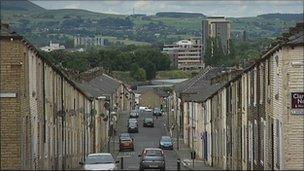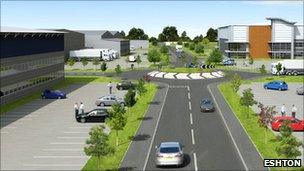Burnley faces up to spending cuts
- Published

Burnley's upward trajectory was hit by the recession, it is claimed
People on incapacity benefits in Burnley were given an insight into the post Spending Review landscape this week when they became the first in England to be reassessed ahead of UK-wide welfare reform.
For a town like Burnley, nestled in the east Lancashire hills about 25 miles north of Manchester, this is significant.
About 6,400 people in the borough receive the payments and recent Experian research commissioned by the BBC highlighted a relatively high overall number of benefit claimants.
It was one of a number of indicators - others included the town's large number of insolvent businesses, rock-bottom house prices and some of the worst GCSE results in England - used to rate the area's resilience to economic shocks.
Burnley did not fare well, ranking 314 out of 324 council areas.
'Place to invest'
"It's all data we were familiar with," said Steve Rumbelow, Burnley Council's chief executive. "Whether it actually reflects reality I think is a different question.
"What it masks is the fact that Burnley had started on the upward trajectory and of course we were knocked off track when the recession hit, because we had just started that journey. We are back on that track now."
As evidence, the council points to a recent upturn in companies moving to the area, a new town centre retail development and the Burnley Bridge business park development, which it is hoped will create up to 1,600 jobs on the outskirts of the town.
"I certainly think that more and more businesses are seeing Burnley as a place to do business and a place to invest," Mr Rumbelow added.
"We need to do more, but there are jobs around and we are creating opportunities for new jobs."
Despite the optimism, Burnley Council - like most other authorities - will be cutting jobs as part of its preparations for 20 October's Comprehensive Spending Review.
It has already cut a number of projects officials felt were not value for money and last week it began consulting staff and unions about 90 potential redundancies - about 15% of its current workforce - to help save £2m.

There are hopes the Burnley Bridge business park development will go ahead
"The reason we're doing it now is to make sure we are ready to implement it from April next year. If we don't deal with what we need to deal with at that point, we'll end up having to make bigger cuts if we don't realise all the savings within that year," explained Mr Rumbelow.
Jobs will be cut across all departments but the council insists "essential services" will be maintained.
The fear among volunteers, community groups and non-profit organisations - the so-called third sector - is the as-yet unnamed non-essential services that could be hit.
Near the entrance of a neat housing estate on the edge of the town lies the South West Burnley Community Enterprise Centre, a facility offering a range of free activities for residents including cooking classes, yoga and even belly dancing.
Although the building's annual £70,000 running costs are covered by hiring out its facilities, its projects - such as the recent healthy eating, active living (Heal) campaign - are almost exclusively funded by the Big Lottery Fund.
And according to Chris Launder, who has been running the centre since 2004, spending cuts will still have an impact on their work.
"Obviously the council, like everyone else, are just waiting to find out what the cuts are going to be and where they can best make the cuts locally," she said.
"We're slightly concerned because there are so many third sector organisations who are 90% reliant on local authority funding, who will have that funding stopped, they will then be looking at all the other avenues to bring funding down.
"The Big Lottery is a popular way of getting some money so it's going to become very, very competitive."
As well as helping more than 900 residents embrace a healthier lifestyle through its Heal project, the building also hosts a UK Online centre, empowering over 50s in the area to help them become digitally active.
"We are a UK Online Centre so we do receive government funding and, like a lot of other centres, we are waiting in anticipation of next week's Comprehensive Spending Review," Mrs Lauder added.
"We're hoping that the government won't see fit to reduce the funding they give to us."
- Published11 October 2010
- Published9 September 2010
- Published9 September 2010